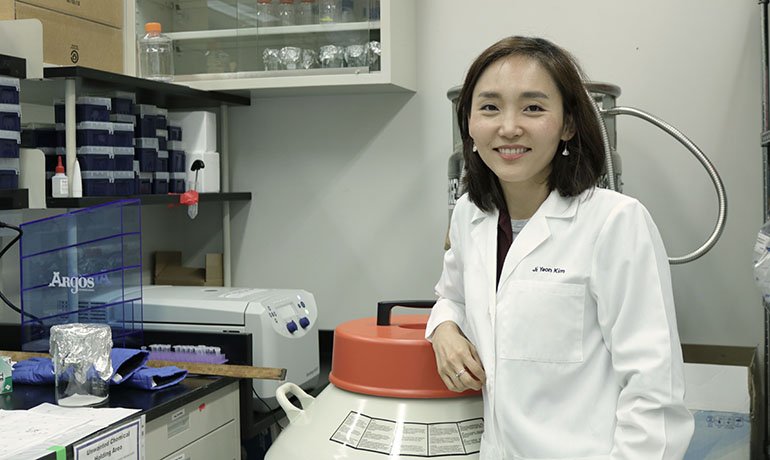
Growing up, Jiyeon Kim couldn’t wait for dinner.
Each night the precocious young girl would sit mesmerized listening to stories her physician parents would share about treating patients that day. It was a time that Kim, PhD, a University of Illinois Cancer Center member, looked forward to daily. At the time they didn’t know their talks would spur their daughter to a life devoted to science and work to develop drugs that could someday help save the lives of their patients.
Kim’s laboratory is studying the fundamental molecular mechanisms underlying cancer metabolism – with a specific focus on nitrogen metabolism – and to identify metabolic liabilities that can be targeted therapeutically.
“Cancer today is widely recognized as a metabolic disease,” said Kim, assistant professor of biochemistry and molecular genetics. “To grow, cancer cells aggressively acquire and convert nutrients from their environment into the cellular components necessary to support abnormal growth. Particular gene mutations traditionally underpin these metabolic changes.
“My lab is interested in understanding how a combination of gene mutations in lung cancer alters metabolism and how these changes impose liabilities that could be exploited therapeutically.”
The study of cancer metabolism has largely focused on carbon (such as glycolysis), the pentose phosphate pathway, and the citric acid cycle, Kim said. Little attention, however, has been given to investigating the functional roles of nitrogen metabolism in cancer biology. Until recently, nitrogen has been a limiting resource in growth, she said. Studying these pathways could uncover effective therapies, she said.
Kim’s latest research focuses on identifying metabolic dependences and liabilities in KRAS/LKB1 co-mutant non-small cell lung cancer by integrating metabolomics analysis and stable isotope tracing with other –omics analysis. Once her initial study is complete, Kim will expand her research to examine and identify altered metabolic pathways – specifically nitrogen metabolism – in various types of cancer where mutation profiling, biomarker discovery or targeted therapy has not been thoroughly explored, especially in bladder, liver, and gastroesophageal (GE) junction cancer.
Growing up in South Korea, Kim envisioned herself practicing medicine like her parents. An experiment in high school, however, captured her imagination and sent her on a different career path.
“We studied how vitamin B could reduce tumor size in a mouse infected with bladder cancer,” Kim said. “Observing how the tumors became noticeably smaller in the water was revelatory. How did that happen? At that moment I realized I wanted to understand the underlying mechanisms of cancer progression and treatment, and especially the link to metabolism.”
Various new studies have revealed the vast heterogeneity of cancer metabolism, with contributing factors being tissue of origin, histology, and tumor-specific genetic programs, Kim said.
“Further investigation into the heterogeneity of cancer metabolism will aid in the development of personalized therapeutic strategies,” Kim said. “By translating bench-side work to bedside reality, I hope to build strong relationships with physicians and collaboratively exchange research to further our understanding and treatment of cancer. I firmly believe in the translational potential of metabolomics to identify new metabolism guided therapies.
“Discoveries about the biology of cancer have enormous potential to change the way we treat patients,” Kim said. “My goal is to establish an expertise in the carbon-nitrogen metabolism of cancer and translate that knowledge to collaborations beyond the biology laboratory. I want to ultimately make a meaningful impact on the lives of cancer patients.”
